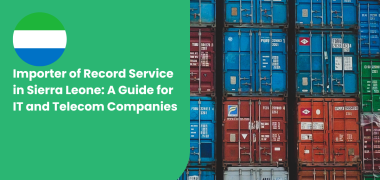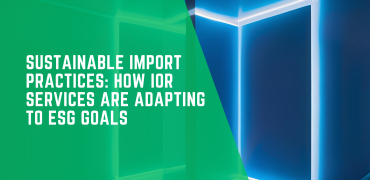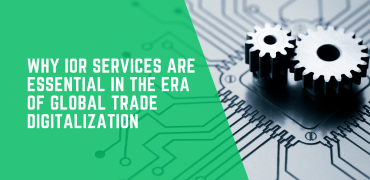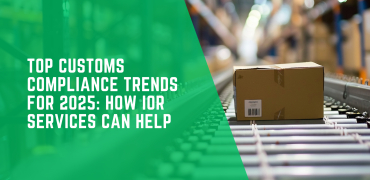The IT and telecom sectors are rapidly expanding, with companies looking to establish and grow their operations in emerging markets like Sierra Leone. However, importing equipment into Sierra Leone involves navigating complex regulations, taxes, and compliance requirements. This guide provides comprehensive information on using an Importer of Record (IOR) service in Sierra Leone, tailored for IT and telecom companies. It covers the import duties and taxes, special permits and approvals needed, and the benefits and challenges of using an IOR service.
What is an Importer of Record (IOR)?
An Importer of Record (IOR) is an entity responsible for ensuring that imported goods comply with local laws and regulations. The IOR handles all aspects of the import process, including:
- Documentation: Preparing and submitting all necessary import documents.
- Customs Clearance: Ensuring goods are cleared through customs.
- Payment of Duties and Taxes: Calculating and paying any applicable duties and taxes.
- Compliance: Ensuring the imported goods meet local regulatory standards.
For IT and telecom companies, using an IOR service is crucial to streamline the import process and avoid potential legal and financial pitfalls.
Importance of IOR Services for IT and Telecom Companies in Sierra Leone
- Regulatory Expertise: Sierra Leone has specific import regulations that can be complex. An IOR service provider has the expertise to navigate these regulations, ensuring compliance and avoiding delays.
- Customs Procedures: The customs clearance process in Sierra Leone requires accurate documentation and adherence to strict guidelines. An IOR manages these procedures efficiently.
- Cost Management: Import duties and taxes can be significant. An IOR helps manage these costs through accurate classification and taking advantage of any available exemptions.
- Risk Mitigation: Importing goods involves risks such as non-compliance, delays, and additional costs. An IOR mitigates these risks by managing the entire import process.
Import Duties and Taxes on IT & Telecom Equipment
Understanding the import duties and taxes is essential for IT and telecom companies planning to import equipment into Sierra Leone. The primary duties and taxes include:
- Customs Duty: The rate varies depending on the type of equipment. Generally, IT and telecom equipment can attract customs duty rates ranging from 0% to 20%, depending on their classification under the Harmonized System (HS) code.
- Goods and Services Tax (GST): Sierra Leone applies a GST rate of 15% on imported goods, including IT and telecom equipment. GST is calculated on the CIF (Cost, Insurance, and Freight) value of the goods plus any applicable customs duty.
- Excise Duty: Certain electronic items may be subject to excise duties. It is essential to check whether specific imported equipment falls under this category.
- Environmental Levy: There may be an environmental levy on certain electronic equipment to promote environmental sustainability. The rate and applicability of this levy depend on the type of equipment.
Special Permits and Approvals Needed
Importing IT and telecom equipment into Sierra Leone requires obtaining specific permits and approvals to ensure compliance with local regulations. Key permits and approvals include:
- Telecommunications Equipment Type Approval: All telecom equipment must be approved by the National Telecommunications Commission (NATCOM) in Sierra Leone. This approval process ensures that the equipment meets local standards and does not interfere with existing networks.
- Import Permit: An import permit is required for certain categories of goods, including some IT and telecom equipment. This permit is issued by the Sierra Leone Standards Bureau (SLSB) and ensures compliance with local regulations.
- Environmental Clearance: For electronic equipment with potential environmental impacts, an environmental clearance from the Environment Protection Agency (EPA) may be required.
- Safety and Compliance Certification: Certain IT and telecom equipment must meet specific safety and compliance standards. Certification from recognized bodies may be required to demonstrate compliance.
Steps to Engage an IOR Service for IT and Telecom Companies
Engaging an IOR service involves several steps to ensure a smooth and compliant import process:
- Identify a Reputable IOR Service Provider: Research and select an IOR service provider with experience in handling IT and telecom equipment in Sierra Leone. Consider their reputation, expertise, and range of services.
- Assess Import Requirements: Work with the IOR provider to assess the specific import requirements for your equipment, including necessary permits, approvals, and compliance certifications.
- Documentation Preparation: Ensure all required documentation is prepared accurately, including commercial invoices, packing lists, certificates of origin, and permits.
- Customs Clearance: The IOR provider handles customs clearance, ensuring all documentation is correctly submitted and the equipment complies with local regulations.
- Payment of Duties and Taxes: The IOR provider calculates and pays any applicable duties and taxes on your behalf, ensuring compliance with local tax laws.
- Delivery and Logistics: Once customs clearance is complete, the IOR provider manages the logistics of delivering the equipment to its final destination in Sierra Leone.
Benefits of Using an IOR Service for IT and Telecom Companies
Using an IOR service offers several benefits for IT and telecom companies importing equipment into Sierra Leone:
- Simplified Import Process: The IOR service handles all aspects of the import process, from documentation to customs clearance, making it easier for companies to manage imports.
- Regulatory Compliance: IOR service providers have in-depth knowledge of local regulations, ensuring all imports comply with Sierra Leone’s laws and standards.
- Cost Savings: By accurately classifying goods and taking advantage of any available exemptions, IOR service providers help reduce import costs.
- Risk Reduction: The IOR service mitigates risks associated with importing goods, including delays, non-compliance, and additional costs.
- Focus on Core Business: By outsourcing the import process to an IOR service provider, IT and telecom companies can focus on their core business activities, enhancing productivity and efficiency.
Challenges and Considerations
While using an IOR service offers numerous benefits, there are also challenges and considerations:
- Cost of IOR Services: Engaging an IOR service involves additional costs. Companies need to weigh these costs against the benefits and potential savings from using the service.
- Choosing the Right Provider: Selecting a reputable and experienced IOR service provider is crucial. Companies should conduct thorough research and due diligence to ensure they choose the right partner.
- Compliance and Documentation: Accurate and complete documentation is critical for a smooth import process. Companies must work closely with their IOR service provider to ensure all requirements are met.
- Understanding Local Regulations: While the IOR service provider handles most regulatory aspects, it is essential for companies to have a basic understanding of local regulations to make informed decisions.
Case Study: Successful Use of IOR Service in Sierra Leone
To illustrate the practical benefits of using an IOR service, consider the case of a multinational telecom company that recently expanded its operations to Sierra Leone. The company faced significant challenges with importing sophisticated telecom equipment due to complex regulatory requirements and high import duties.
By engaging a reputable IOR service provider, the company was able to:
- Streamline the Import Process: The IOR service provider handled all aspects of the import process, from obtaining the necessary permits to customs clearance.
- Ensure Regulatory Compliance: The IOR provider’s expertise in local regulations ensured that all imported equipment complied with Sierra Leone’s standards.
- Reduce Costs: Accurate classification of goods and strategic planning by the IOR provider helped the company minimize import duties and taxes.
- Mitigate Risks: The IOR service provider’s comprehensive management of the import process mitigated risks of delays and non-compliance.
As a result, the telecom company successfully established its operations in Sierra Leone, providing high-quality services to the local market without facing significant import-related challenges.
Conclusion
For IT and telecom companies looking to expand their operations to Sierra Leone, using an Importer of Record (IOR) service is a strategic move that simplifies the import process, ensures regulatory compliance, and reduces risks. By understanding the import duties, taxes, and special permits required, and by engaging a reputable IOR service provider, companies can streamline their import operations and focus on their core business activities. Sierra Leone offers a promising market for IT and telecom companies, and with the right support, the import process can be navigated successfully.




